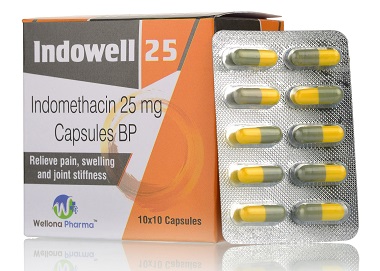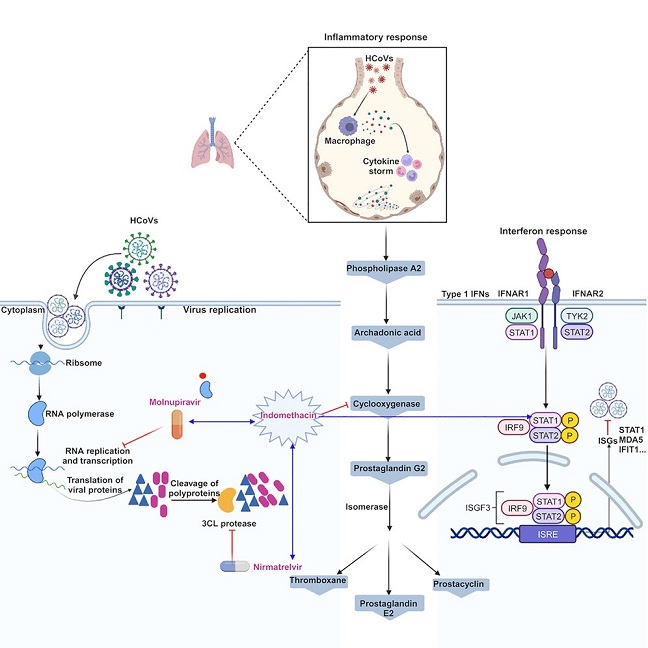Researchers From The Netherlands Identify Indomethacin As A Pan-Coronavirus Antiviral And Anti-Inflammatory Agent
Thailand Medical News Team Aug 17, 2023 1 year, 8 months, 3 days, 18 hours, 58 minutes ago
COVID-19 News: The ongoing battle against coronaviruses has brought forth an urgent need for effective therapeutic strategies that can address both viral replication and the hyperinflammatory response often associated with severe infections. Researchers from Erasmus MC-University Medical Center in Rotterdam, the Netherlands, have made a significant breakthrough by identifying indomethacin, a traditional nonsteroidal anti-inflammatory drug (NSAID), as a promising pan-coronavirus inhibitor. Their findings open up new avenues for combating the diverse array of coronaviruses, including both seasonal and highly pathogenic variants.
 Coronavirus Landscape
Coronavirus Landscape
Coronaviruses encompass a wide family of RNA viruses, some of which have led to severe outbreaks in humans. The emergence of the SARS-CoV-2 virus, responsible for the COVID-19 pandemic, has underscored the need for effective antiviral treatments. Apart from SARS-CoV-2, several other coronaviruses, including seasonal variants, pose threats to vulnerable populations. While antiviral drugs like Paxlovid and molnupiravir have shown promise against SARS-CoV-2, their efficacy against other coronaviruses varies. This calls for the identification of broad-spectrum antivirals that can combat a range of coronaviruses.
Indomethacin: A Dual-Action Antiviral
In the pursuit of such broad-spectrum antivirals, the researchers turned their attention to indomethacin. Originally approved for treating inflammatory conditions, indomethacin has displayed antiviral properties against various viruses, including herpesviruses and hepatitis B.
Notably, earlier studies and
COVID-19 News reports had shown its inhibitory effects on specific coronaviruses like SARS-CoV and SARS-CoV-2. Building on this foundation, the researchers extended their investigation to explore indomethacin's potential against multiple coronavirus variants.
Their experiments revealed that indomethacin demonstrated potent antiviral activity against different SARS-CoV-2 variants and various seasonal coronaviruses.
Unlike other COX inhibitors, indomethacin's anti-coronavirus activity was not contingent on its effects on COX-1 and COX-2 enzymes. Interestingly, indomethacin was found to activate the host's innate immune response, highlighting its potential to bolster the body's defense mechanisms against viral infections.
Synergistic Approach: Combining Indomethacin with Antivirals
While indomethacin's antiviral effects were promising, the study team recognized the need for comprehensive therapeutic strategies. They explored combination therapies involving indomethacin and other antiviral drugs. The results were remarkable, with indomethacin synergistically enhancing the antiviral effects of FDA-approved oral antiviral drugs like molnupiravir and nirmatrelvir. This approach not only increased the efficacy of viral inhibition but also concurrently dampened the inflammatory response, a crucial factor in severe infections.
Boosting Interferon Response
Another noteworthy aspect of indomethacin'
s potential lies in its ability to potentiate the interferon (IFN) response. Interferons play a pivotal role in the body's antiviral defense, and previous studies had explored their potential as treatments for COVID-19. However, the combination of indomethacin with IFN-α exhibited synergistic antiviral effects against a range of coronaviruses, excluding OC43. The study team uncovered indomethacin's ability to enhance interferon response by increasing STAT1 phosphorylation, further solidifying its role as a dual-action antiviral.
Tackling Inflammation and Viral Replication Simultaneously
Severe coronavirus infections are often marked by hyperinflammation, driven primarily by macrophages. Recognizing the importance of addressing both viral replication and inflammation, the researchers tested indomethacin's effects in a co-culture system of human lung cells with macrophages. Encouragingly, indomethacin was shown to inhibit both viral replication and the inflammatory response in this model, underscoring its potential to simultaneously tackle two critical aspects of severe infections.
 Graphical Abstract
Clinical Implications and Future Directions
Graphical Abstract
Clinical Implications and Future Directions
The findings of this study shed light on indomethacin's multifaceted potential as a pan-coronavirus inhibitor. The drug's ability to enhance antiviral response while suppressing inflammation holds promise for treating a spectrum of coronaviruses, from seasonal strains to highly pathogenic variants. Clinical trials have already begun to explore indomethacin's efficacy in treating COVID-19 patients, with some initial positive outcomes. However, further validation through animal models and extensive clinical testing will be necessary before indomethacin-based therapies can become standard practice.
Conclusion
The quest for effective treatments against coronaviruses has taken a significant step forward with the discovery of indomethacin as a pan-coronavirus antiviral and anti-inflammatory agent. By simultaneously inhibiting viral replication and modulating the immune response, indomethacin holds great promise in combatting a range of coronavirus infections.
This groundbreaking research underscores the importance of multifaceted therapeutic approaches and highlights the potential for repurposing existing drugs to address pressing global health challenges.
The study findings were published in the peer reviewed journal: iScience.
https://www.cell.com/iscience/fulltext/S2589-0042(23)01708-X
For the latest
COVID-19 News, keep on logging to Thailand Medical News.

